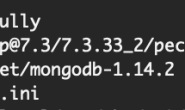基本条件
基本条件足够简单易懂。您可以使用其他符号来获得用于数字的高级过滤器。
|
1
2
3
4
5
6
7
8
9
10
11
12
13
14
15
16
17
18
19
20
21
22
23
24
25
26
27
28
29
30
31
32
33
34
35
36
37
38
39
40
41
42
43
44
45
46
47
48
49
50
51
52
53
54
55
56
57
58
59
60
61
|
$database->select("account", "user_name", [ "email" => "foo@bar.com"]);// WHERE email = 'foo@bar.com' $database->select("account", "user_name", [ "user_id" => 200]);// WHERE user_id = 200 $database->select("account", "user_name", [ "user_id[>]" => 200]);// WHERE user_id > 200 $database->select("account", "user_name", [ "user_id[>=]" => 200]);// WHERE user_id >= 200 $database->select("account", "user_name", [ "user_id[!]" => 200]);// WHERE user_id != 200 $database->select("account", "user_name", [ "age[<>]" => [200, 500]]);// WHERE age BETWEEN 200 AND 500 // 你不仅可以使用单一的字符串或数字值,也可以使用数组$database->select("account", "user_name", [ "OR" => [ "user_id" => [2, 123, 234, 54], "email" => ["foo@bar.com", "cat@dog.com", "admin@medoo.in"] ]]);// WHERE// user_id IN (2,123,234,54) OR// email IN ('foo@bar.com','cat@dog.com','admin@medoo.in') // 否定条件 (自Medoo 0.9起支持)$database->select("account", "user_name", [ "AND" => [ "user_name[!]" => "foo", "user_id[!]" => 1024, "email[!]" => ["foo@bar.com", "cat@dog.com", "admin@medoo.in"], "city[!]" => null ]]);// WHERE// `user_name` != 'foo' AND// `user_id` != 1024 AND// `email` NOT IN ('foo@bar.com','cat@dog.com','admin@medoo.in') AND// `city` IS NOT NULL // 可以从 select()或get()方法的结果取得$database->select("account", "user_name", [ "user_id" => $database->select("post", "user_id", ["comments[>]" => 40])]);// WHERE user_id IN (2, 51, 321, 3431) |
相对条件
相对条件可以描述数据和数据之间的复杂关系。您可以使用“and”和“or”来构建复杂的相对条件查询。
|
1
2
3
4
5
6
7
8
9
10
11
12
13
14
15
16
17
18
19
20
21
22
23
24
25
26
27
28
29
30
|
// [基本的相对条件]$database->select("account", "user_name", [ "AND" => [ "user_id[>]" => 200, "age[<>]" => [18, 25], "gender" => "female" ]]);// WHERE user_id > 200 AND age BETWEEN 18 AND 25 AND gender = 'female' $database->select("account", "user_name", [ "OR" => [ "user_id[>]" => 200, "age[<>]" => [18, 25], "gender" => "female" ]]);// WHERE user_id > 200 OR age BETWEEN 18 AND 25 OR gender = 'female' // [复合的相对条件]$database->has("account", [ "AND" => [ "OR" => [ "user_name" => "foo", "email" => "foo@bar.com" ], "password" => "12345" ]]);// WHERE (user_name = 'foo' OR email = 'foo@bar.com') AND password = '12345' |
全文搜索
通过目标关键词搜索记录。
|
1
2
3
4
5
6
7
8
9
10
11
12
13
14
15
16
17
18
19
20
21
22
23
24
25
26
27
28
29
30
31
32
33
34
35
36
37
38
39
40
41
42
43
44
45
46
47
48
49
50
51
52
53
|
// [MATCH]$database->select("post_table", "post_id", [ "MATCH" => [ "columns" => ["content", "title"], "keyword" => "foo" ]]);// WHERE MATCH (content, title) AGAINST ('foo') // [LIKE]// The default connector of LIKE is AND$database->select("account", "user_id", [ 'LIKE' => [ 'location' => "foo", 'nickname' => "foo", 'user_name' => "foo", 'description' => "foo" ]]); $database->select("account", "user_id", [ 'LIKE' => [ 'AND' => [ 'location' => "foo", 'nickname' => "foo", 'user_name' => "foo", 'description' => "foo" ] ]]);// WHERE (// location LIKE '%foo%' AND// nickname LIKE '%foo%' AND// user_name LIKE '%foo%' AND// description LIKE '%foo%'// ) $database->select("account", "user_id", [ 'LIKE' => [ 'OR' => [ 'location' => "foo", 'nickname' => "foo", 'user_name' => "foo", 'description' => "foo" ] ]]);// WHERE (// location LIKE '%foo%' OR// nickname LIKE '%foo%' OR// user_name LIKE '%foo%' OR// description LIKE '%foo%'// ) |
附加条件
|
1
2
3
4
5
6
7
8
9
10
11
12
13
14
15
16
17
18
19
|
$database->select("account", "user_id", [ "GROUP" => "type", // "ORDER" => "age DESC" "ORDER" => "age", // Must have to use it with ORDER together "HAVING" => [ "user_id[>]" => 500 ], // LIMIT => 20 "LIMIT" => [20, 100]]);// SELECT user_id FROM account// GROUP BY type// ORDER BY age// HAVING user_id > 500// LIMIT 20,100 |
原文标题:WHERE语法-Medoo使用指南
原文链接:http://loiy.net/post/566.html
转载请注明:苏demo的别样人生 » WHERE语法-Medoo使用指南

 微信扫一扫,打赏作者吧~
微信扫一扫,打赏作者吧~


